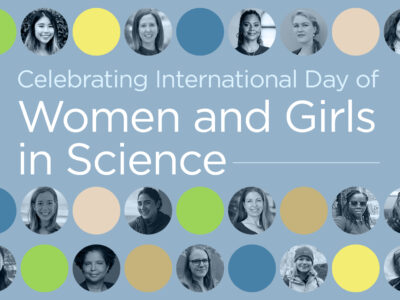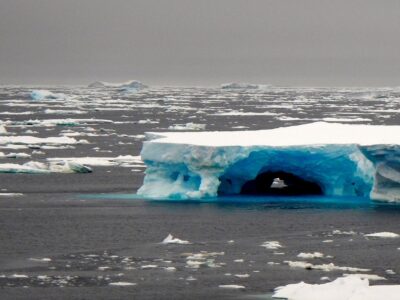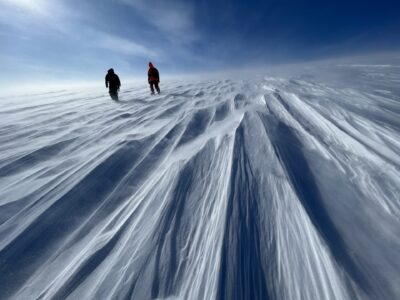
2022 has been a good year for climate action. The Inflation Reduction Act will invest $370 billion toward a low-carbon economy. The Bipartisan Infrastructure Law promises to reduce U.S. carbon emissions while making our infrastructure more resilient to climate change impacts. And wealthy nations agreed to create a fund that will help developing countries who are suffering the worst damages from the changing climate.
Here at the Columbia Climate School, we celebrated our first graduating class of students, who are now out there in the world making a difference. We recently announced that we’re partnering in the creation of a new major for undergraduate students focusing on Climate System Science. And on State of the Planet, we published hundreds of stories aimed toward helping people better understand our current, past, and future climate, and what’s needed to build a safer and healthier future. You can check out some of our favorites below.
The year hasn’t been without its setbacks. The world still may not be doing “enough,” but we’re finally doing something, and that matters. Sustainability is a journey — not a destination — and we’re happy to be on the journey with you. Happy holidays, and see you in the new year!
Some of our most popular posts from 2022
- How Climate Change Will Affect Plants – While elevated levels of CO2 can help plants grow, the impacts of climate change mean it’s not all good news for the plant world.
- Cryptocurrency’s Dirty Secret: Energy Consumption – To be a true game changer, crypto may need to come clean and go green.
- Let’s Build a Train From Brooklyn to Queens and Someday to the Bronx – Professor Steve Cohen makes the case that we should build an interborough train line.
- How Deep Is Europe’s Dependence on Russian Oil? – A global research scholar with the Center on Global Energy Policy answers questions about Europe’s dependence on Russia and how this adverse relationship developed.
- What Is Decarbonization, and How Do We Make It Happen? – To keep the planet from warming more than 1.5 degrees C above pre-industrial levels, economies must rapidly decarbonize. What will this involve?
Most covered in the media

- Dinosaurs Took Over Amid Ice, Not Warmth, Says a New Study of Ancient Mass Extinction – There is new evidence that ancient high latitudes, to which early dinosaurs were largely relegated, regularly froze over, and that the creatures adapted—an apparent key to their later dominance.
- Scientists Say a Shipwreck Off Patagonia Is a Long-Lost 1850s Rhode Island Whaler – In 1858, a sailing ship left Warren, R.I., to hunt the globe for whales, and never returned. Where did it end up? Researchers from the southern and northern hemispheres joined to investigate.
- In Sediments Below Antarctic Ice, Scientists Discover a Giant Groundwater System – For the first time, scientists have mapped in detail water locked in a deep basin far under the Antarctic ice. The discovery could have implications for how the continent reacts to, or even contributes to, climate change.
- 2022 World Food Prize Awarded to Columbia Scientist Cynthia Rosenzweig – The award recognizes her pioneering work in modeling the impact of climate change on food production worldwide.
- Megadrought in Southwest Is Now the Worst in at Least 1,200 Years, Study Confirms – The continuation of dry conditions across a wide region has broken records going back to the year 800. Researchers believe climate change is largely to blame.
Video highlights
This event marking the tenth anniversary of Hurricane Sandy explored the effectiveness of recovery efforts, and what we can learn from Sandy to improve climate justice and resilience in the future.
Columbia Climate School co-hosted this discussion about how climate change and a history of environmental injustice is impacting communities like Harlem, and what can be done about it.
In this talk, researcher Mike Kaplan explains what the Little Ice Age was, and why we should care about it.
Thinking of enrolling in a climate- or sustainability-focused educational program, but you’re not sure which one? This presentation provides an overview of Columbia’s graduate-level programs — including Climate and Society, Sustainability Management, Sustainability Science, and Environmental Science and Policy — and how each one is unique.
Don’t miss these other important stories
GlacierHub, a blog managed by Columbia Climate School anthropologist Ben Orlove, published a variety of fascinating stories looking at climate change impacts through the lens of glaciers and the people and ecosystems who rely on them. Don’t miss this one, which includes a harrowing video of a collapsing glacier.
Our student contributors shared fun and meaningful anecdotes in personal essays, and wrote some pretty convincing opinion pieces. Here are just a few of our favorites:
- Individually, We Can’t End Climate Change. But That Doesn’t Mean We Shouldn’t Try.
- Environmentalism Isn’t Partisan — At Least It Shouldn’t Be
- Why We Need to Ban Gas in New York State Buildings
- The Art of Catching a Bobcat
Climate stories from across Columbia University
- Solar Panels Reduce Co2 Emissions More Per Acre Than Trees – and Much More Than Corn Ethanol – Calculations from an expert at the Sabin Center for Climate Change Law.
- Air Pollution and Climate Change Take a Growing Toll on Children’s Health: A paper cites dozens of studies on how fossil fuel combustion harms kids’ physical and mental health.
- The Big C’s: Climate Change and Cancer: The key to surviving climate change may be in our epigenome.
- How Electric Vehicles Could Fix the Electrical Grid: Local governments and policymakers are anxious about the U.S. grid’s ability to withstand ever-increasing demand. Consumers could hold the key to an untapped resource.
- A New Era for Environmental Justice: The Columbia Energy Exchange podcast interviews environmental justice pioneer Robert Bullard.
- The Ice Detectives: Columbia researchers go to the ends of the earth to crack the coldest case of all.














